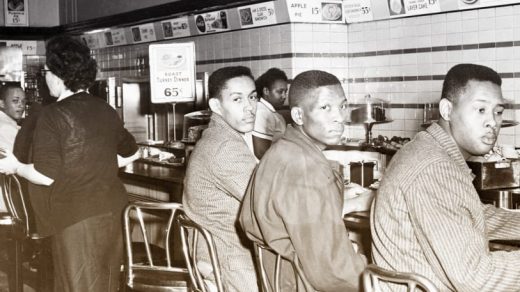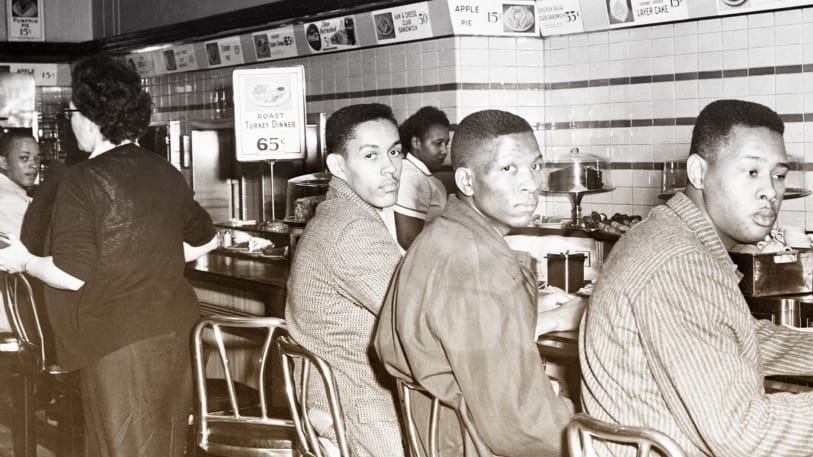Eight Times American Brands Got Political
With the president of the United States regularly taking aim at companies via his Twitter account, brands from General Motors to Nordstrom have found themselves unwittingly caught up in the political news of the day. An offhand comment from an executive or a controversial SNL skit can prompt partisan social media spats, make it onto cable news, and send a company’s stock tumbling. Fast Company’s Austin Carr recently dug into this new phenomenon, in which brands find themselves forced—be it by employees, consumers, or the president himself—to take a stance. Here are eight times in the past century when organizations got political—whether they wanted to or not.
1947: The Brooklyn Dodgers
When the Dodgers called Jackie Robinson up to the major leagues, fans and players alike were outraged—a person of color had never played in baseball’s top flight before. But the infielder had a powerful person backing him up: Branch Rickey, the Dodgers’ general manager, who had long been keeping his eyes out for a talented black player to integrate into the team. Some of Rickey’s other players threatened to strike, as did players on other teams, but the general manager stood his ground, telling them that they could either play alongside Robinson or be traded. His strong stance forced other prominent baseball figures to get in line, too: When National League President Ford Frick heard about the strike, he issued a terse statement. “This is the United States of America and one citizen has as much right to play as another,” Frick said. “The National League will go down the line with Robinson no matter the consequences.”
1960: Woolworth’s
On February 1, 1960, four black college students sat down at a Woolworth’s lunch counter in Greensboro, North Carolina. That action—a mundanity in today’s world—launched a nationwide movement. The men remained at the lunch counter until closing time, despite being refused service, and returned daily with an increasing number of people. The protest, which echoed earlier “don’t buy where you can’t work” boycotts, proved effective, with Woolworth’s giving in and desegregating less than six months later.
1973: Avon
Avon had been tentatively moving toward diversity and inclusion for years, recruiting black sales representatives during World War II and running its first advertisement that specifically targeted black women in a 1966 issue of Ebony magazine. After pledging to fight discrimination in its 1972 Statement of Corporate Responsibility, the company was approached by Operation PUSH, a civil rights group founded by Reverend Jesse Jackson, and urged to implement more impactful measures. In response, Avon agreed to a handful of new initiatives, including setting diversity targets for its workforce, increased advertising in black markets, and reinvestment in black-owned companies—progressive measures for the time.
1985: Pepsi
As the anti-apartheid movement grew globally, multinational companies came under increasing pressure from activists and consumers alike to walk away from South Africa. The world’s largest soda companies, Coca-Cola and Pepsi, were no exception. After years of trying to appease activists with smaller measures—including an educational trust fund for black South African workers and a new Worldwide Code of Conduct that, hypothetically at least, protected employees from discrimination—Pepsi pulled out of South Africa in 1985. Coca-Cola followed suit a year later, but subtly continued to sell to the South African market through a plant in neighboring Swaziland. When Pepsi returned to the country after apartheid, it didn’t exactly receive a hero’s welcome for its social conscience; instead, it found that Coke’s brand presence was stronger than ever, forcing Pepsi to exit the market yet again in 1997. (It quietly re-entered in 2005, via a franchise agreement.)
1992: Levi’s
With the country engaged in a culture war over homosexuality during the presidential election, Levi’s took a side: It announced that it would no longer provide financial support to the Boy Scouts of America due to the organization’s refusal to admit gay people into its ranks. The amount of money was insignificant—less than $100,000 a year—but the stance proved controversial. Republicans called for a boycott of the brand (one congressman reportedly urged Texans to burn their jeans in the streets), while progressives hailed it as a sign of corporate America’s increasing embrace of LGBT rights, a triumph that could be traced back to AIDs activism.
1996: IBM
IBM wasn’t the first corporation to extend health care benefits to same-sex domestic partners, but it was one of the largest and most influential companies to do so. Big Blue didn’t shy away from the political and social implications of its policy change, either, with an executive stating that the company’s “commitment to nondiscrimination” was the primary reason for the move. Given IBM’s conservative reputation, the news caused a stir and amplified the national conversation around gay marriage, coming just days before Bill Clinton signed the Defense of Marriage Act, which officially defined marriage as between a man and a woman.
2004: Patagonia
After years of promoting sustainable materials and donating to environmental organizations, Patagonia got political: It launched Vote the Environment, a campaign to get outdoor activists and enthusiasts to the polls for that year’s presidential election and make issues like climate change a political priority. “I’m just so disappointed that there’s nobody talking about the environment,” said Patagonia cofounder Yvon Chouinard at the time. “I want the environment to be a much bigger part of the political process.” The company has continued to run the campaign, now called Vote Our Planet, every election year since.
2016: PayPal
In response to North Carolina’s notorious “bathroom bill,” which mandates that people use restrooms corresponding to the gender on their birth certificate, PayPal withdrew its plans to open a new global operations center in Charlotte, delivering an economic blow for the area. The company would have employed around 400 locals and invested some $3.6 million in the new facility. Other organizations, including Deutsche Bank and the NCAA, made similar announcements; the Charlotte Chamber estimated that overall, the bill cost Charlotte and the surrounding county $285 million in economic activity.
Fast Company , Read Full Story
(89)














